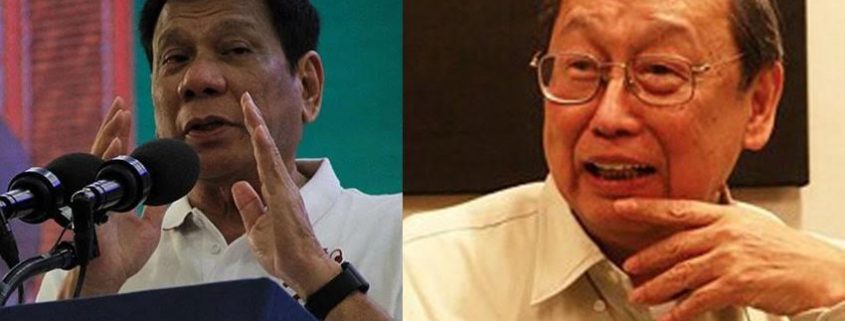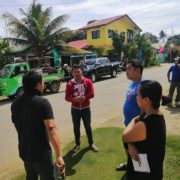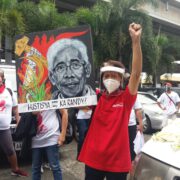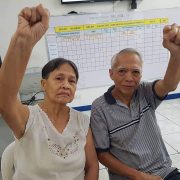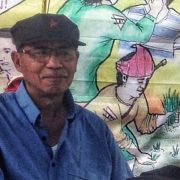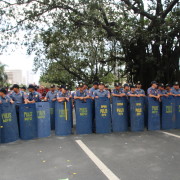Sison: CPP ready to terminate ceasefire if political detainees are not released by January
Kodao’s Raymund Villanueva interviews National Democratic Front of the Philippines chief political consultant Prof. Jose Maria Sison on President Rodrigo Duterte’s promise to release all political prisoners, ceasefire, peace talks, new AFP chief of staff Eduardo Año, and extra-judicial killings connected to the so-called drug war.
Kodao: In a recent interview, you said the NDFP (National Democratic Front of the Philippines) may work for a bilateral ceasefire as long as the GRP (Government of the Republic of the Philippines) President Rodrigo Duterte makes good on his promise to release all 434 political prisoners within 48 hours after delivery to him of a signed copy by GRP panel chair Silvestre Bello III and GRP panel member Angela Librado-Trinidad. What is your explanation for advising the revolutionary movement may accept Duterte’s challenge?
Prof. Jose Ma. Sison (JMS): I made the advice after reading a news announcement that President Duterte would release all the political prisoners within 48 hours after the GRP and NDFP panels sign a bilateral ceasefire agreement. I asked NDFP chief negotiator Fidel Agcaoili to contact immediately his counterpart GRP chief negotiator Silvestre Bello III whether the report is true and whether the GRP panel is willing to meet the NDFP panel within the second half of December regarding the bilateral ceasefire agreement.
Kodao: What should the NDFP and the revolutionary movement do with the signed bilateral ceasefire if the GRP president fails to deliver on his promise?
JMS: The signing of the bilateral ceasefire agreement by the GRP and NDFP panels can come ahead of the amnesty and release of all political prisoners by President Duterte but said agreement becomes valid and effective only upon the actual release of said political prisoners and upon the approval of the agreement by the GRP and NDFP principals. No chance for the GRP to get the bilateral ceasefire agreement and then renege on the commitment to amnesty and release all political prisoners.
Kodao: How can Duterte affect such when his peace adviser (Sec. Jesus Dureza) and the GRP panel have been saying the notoriously slow judicial processes must be followed?
JMS: Indeed, the OPAPP (Office of the Presidential Adviser on the Peace Process) is known to block the amnesty and release of the political prisoners and is supposed to have advised Duterte accordingly. The GRP side has the power to prolong the imprisonment of the political prisoners and make them suffer needlessly an injustice in violation of the CARHRIHL and the Hernandez political offense doctrine.
But the Central Committee of the Communist Party of the Philippines is ready to terminate the August 28, 2016 unilateral declaration of interim ceasefire in case no amnesty and release of all political prisoners would occur in December or January. We shall be back to a situation of negotiating while fighting, unless the GRP terminates the peace negotiations completely.
Kodao: How long would such a bilateral ceasefire take effect?
JMS: If the bilateral ceasefire agreement shall be forged, it shall be valid and effective indefinitely between the armed forces and units of the GRP and NDFP.
Kodao: What are the conditions that would compel the NDFP to end such a bilateral ceasefire?
JMS: The NDFP can end such a bilateral ceasefire agreement if the GRP grossly and systematically violates it, loses interest in the negotiations of the substantive agenda and is interested merely in using the bilateral ceasefire as an instrument of capitulation and pacification at the expense of the people and the revolutionary forces.
Kodao: Some regional commands of the NPA and the CPP are thinking of terminating their existing unilateral ceasefire declaration because of several documented cases of violations of the GRP’s unilateral ceasefire declaration by its own armed forces. What would happen to such sentiments and the people’s complaints of ceasefire violations if the NDFP would sign a bilateral ceasefire with the GRP at this point?
JMS: The NDFP should not sign a bilateral ceasefire agreement that does not address the violations made by the AFP, PNP, paramilitary forces and death squads during the period of reciprocal unilateral ceasefires. Provisions must be made for pre-empting and preventing the recurrence of such violations. The military and police should be restricted to barracks and should not usurp civilian functions. They should not be able to use any pretext to commit atrocities against the people within the territory of the people’s democratic government.
Kodao: President Duterte met with NDFP panel chair Fidel Agcaoili, NDFP panel member Benito Tiamzon and consultants just last weekend, which reportedly went well. Then a day before Duterte appointed Lt. Gen. Eduardo Año as new AFP chief of staff, he issued his ultimatum. What do you think would happen to a bilateral ceasefire when Duterte’s new chief of staff is an alleged human rights violator and a “rebel hunter?”
JMS: In his candid moments, President Duterte himself admits that the GRP is reactionary and rotten, serving US imperialism and controlled by oligarchs, with civilian, military and police officals involved in corruption and criminality, including illegal drugs. To make a good bilateral ceasefire agreement and continue the peace negotiations with the NDFP, Duterte must assume the responsibility of fixing the criminals and self-contradictions in the GRP. He must know how to control his new AFP chief of staff or replace him if he can. Otherwise, a just and lasting peace will become impossible. And the armed revolution will continue.
Kodao: There has been more than five thousand killed under Duterte’s so-called war on drugs in his five months in office. How should the NDFP raise this issue under CARHRIHL during the formal peace talks? Is it still beneficial for the revolutionary movement to engage in formal talks with the Duterte government under which all these killings are happening?
JMS: The extrajudicial killing of 5,800 suspects of being drug pushers is a valid issue that can be discussed under the CARHRIHL, especially because there are already many complaints that the military, police and paramilitaries of the GRP are using Oplan Tokhang for the purpose of smearing and murdering revolutionaries.
The CPP, NPA and NDFP have already pointed out that the anti-drug campaign might be like Plan Columbia under which tens of thousands of paramilitaries were organised not really to fight the drug traders but the revolutionary forces.
Kodao: It is being announced that the next round (third) of formal talks would be on January 18-24 in Rome, Italy. What would be on the agenda and how is the NDFP preparing for this?
JMS: The GRP and NDFP Panels will take up the condition of the political prisoners and the unfulfilled promises to release them. There is yet no basis to say that the matter of bilateral ceasefire agreement will be taken up before or during the third round of peace talks. I expect that the negotiations of the CASER (Comprehensive Agreement on Socio-Economic Reforms) by the RWCs (Reciprocal Working Committees) concerned will make some significant advance to show that the peace process is really moving ahead. CASER is the meat of the entire peace negotiations. It offers the prospects of national industrialization, genuine land reform, improved incomes and means of livelihood and expansion of social services.
Kodao: Why should the Filipino people support the continuation of the peace process?
JMS: The Filipino people support the continuation of the peace negotiations because they wish substantial social, economic and political reforms to be achieved across the negotiating table. However, if they are frustrated in this regard, they will also be able to see more clearly the justness and necessity of the people’s democratic revolution through people’s war. After all, the crisis of global capitalism and the domestic ruling system continues to worsen and cry out for revolution.
(Interview and Sison photo by Raymund B. Villanueva/Duterte photo by Davao Today)

